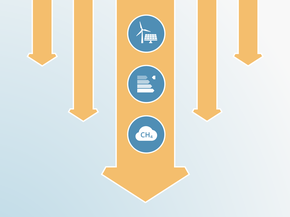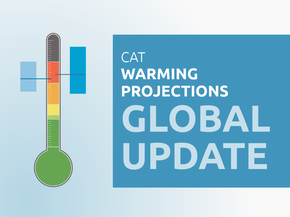Critically Insufficient4°C+
World
NDCs with this rating fall well outside of a country’s “fair share” range and are not at all consistent with holding warming to below 2°C let alone with the Paris Agreement’s stronger 1.5°C limit. If all government NDCs were in this range, warming would exceed 4°C.
Highly insufficient< 4°C
World
NDCs with this rating fall outside of a country’s “fair share” range and are not at all consistent with holding warming to below 2°C let alone with the Paris Agreement’s stronger 1.5°C limit. If all government NDCs were in this range, warming would reach between 3°C and 4°C.
Insufficient< 3°C
World
NDCs with this rating are in the least stringent part of a country’s “fair share” range and not consistent with holding warming below 2°C let alone with the Paris Agreement’s stronger 1.5°C limit. If all government NDCs were in this range, warming would reach over 2°C and up to 3°C.
2°C Compatible< 2°C
World
NDCs with this rating are consistent with the 2009 Copenhagen 2°C goal and therefore fall within a country’s “fair share” range, but are not fully consistent with the Paris Agreement long term temperature goal. If all government NDCs were in this range, warming could be held below, but not well below, 2°C and still be too high to be consistent with the Paris Agreement 1.5°C limit.
1.5°C Paris Agreement Compatible< 1.5°C
World
This rating indicates that a government’s NDCs in the most stringent part of its “fair share” range: it is consistent with the Paris Agreement’s 1.5°C limit.
Role model<< 1.5°C
World
This rating indicates that a government’s NDC is more ambitious than what is considered a “fair” contribution: it is more than consistent with the Paris Agreement’s 1.5°C limit.
Sources
List of references
- Beetz, B., & Bellini, E. (2018, March 13). Unbelievable: Coal puts halt to South Africa’s renewables industry. PV Magazine. Retrieved from https://www.pv-magazine.com/2018/03/13/unbelievable-coal-puts-halt-to-south-africas-renewables-industry/#.Wqf6n7Z4WZ0.twitter
- Bosch, J. M., & von Gadow, K. (1990). Regulating Afforestation for Water Conservation in South Africa. South African Forestry Journal, 153(1), 41–54. https://doi.org/10.1080/00382167.1990.9629032
- Climate Action Tracker. (2018). Climate Action Tracker Data Portal. Retrieved from http://climateactiontracker.org/decarbonisation/intro [accessed on 31 October 2018]
- Climate Home News. (2019). South Africa set to introduce long-awaited carbon tax in June. Retrieved from https://www.climatechangenews.com/2019/02/20/south-africa-set-introduce-long-awaited-carbon-tax-june/ [accessed on 25 April 2019]
- Creamer, T. (2018, April 4). Radebe says signing of 27 IPP agreements a ‘new dawn’ for renewables in South Africa. Engineering News. Retrieved from http://m.engineeringnews.co.za/article/radebe-says-signing-of-27-ipp-agreements-a-new-dawn-for-renewables-2018-04-04/rep_id:4433
- Deign, J. (2018, February 9). Despite Eskom’s Troubles, a Surprise Change in Fortune for South African Renewables. GTM. Retrieved from https://www.greentechmedia.com/articles/read/surprise-change-in-fortune-for-south-african-renewables#gs.qWzWTnY
- Department of Energy. (2011). Integrated Resource Plan for Electricity 2010-2030. Retrieved from http://www.energy.gov.za/IRP/irp files/IRP2010_2030_Final_Report_20110325.pdf
- Department of Energy. (2013). Bid Window 3 Preferred Bidders’ announcement. Retrieved from http://www.energy.gov.za/IPP/List-of-IPP-Preferred-Bidders-Window-three-04Nov2013.pdf [accessed on 30 August 2017]
- Department of Energy. (2016a). Draft Post-2015 National Energy Efficiency Strategy. Government Gazette. Retrieved from https://www.gov.za/sites/www.gov.za/files/40515_gen948.pdf [accessed on 30 August 2017]
- Department of Energy. (2016b). Integrated Resource Plan Update. Republic of South Africa. Retrieved from http://www.gov.za/sites/www.gov.za/files/40445_gon1431.pdf [accessed on 25 August 2017]
- Department of Energy. (2018). Draft Integrated Resource Plan 2018. Retrieved from http://www.energy.gov.za/IRP/irp-update-draft-report2018/IRP-Update-2018-Draft-for-Comments.pdf [accessed on 30 August 2018]
- Department of Environmental Affairs. (2014a). South Africa’s Greenhouse Gas (GHG) Mitigation Potential Analysis. Retrieved from https://www.environment.gov.za/sites/default/files/docs/mitigationreport.pdf
- Department of Environmental Affairs. (2014b). South Africa’s Greenhouse Gas Mitigation Potential Analysis - Annex G: AFOLU sector. Pretoria, South Africa.
- Department of Environmental Affairs. (2016). Draft GHG National Inventory Report - South Africa: 2000-2012. Retrieved from https://cer.org.za/wp-content/uploads/2014/02/Draft-GHG-Inventory-Report-SA.pdf [accessed on 21 February 2018]
- Department of Environmental Affairs. (2017). South Africa’s 2nd Biennial Update Report. Retrieved from http://unfccc.int/files/national_reports/non-annex_i_parties/biennial_update_reports/application/pdf/south_africa_2nd_bur.pdf [accessed on 21 February 2018]
- Department of Environmental Affairs. (2018a). An analysis of projected greenhouse gas emissions pathways.
- Department of Environmental Affairs. (2018b). Climate Change Bill, 2018: For public comment. Government Gazette. Retrieved from https://www.environment.gov.za/sites/default/files/legislations/climatechangebill2018_gn41689.pdf [accessed on 28 June 2018]
- Department of Environmental Affairs. (2018c). South Africa’s Low-Emission Development Strategy 2050. December 2018. Draft. Pletoria, South Africa: Department of Environmental Affairs, Republic of South Africa. Retrieved from https://www.environment.gov.za/sites/default/files/strategic_plans/southafricas_lowemission_developmentstrategy_dec2018draft.pdf
- Department of Environmental Affairs Republic of South Africa. (2011). Explanatory note: Defining South Africa’s Peak, Plateau and Decline Greenhouse Gas Emission Trajectory. SA Government Position on Climate Change. Retrieved from http://www.climateaction.org.za/cop17-cmp7/sa-government-position-on-climate-change
- Department of Environmental Affairs South Africa. (2014). GHG Inventory for South Africa. Retrieved from https://www.environment.gov.za/sites/default/files/docs/greenhousegas_invetorysouthafrica.pdf
- Department of Transport. (2017a). Bus Rapid Transit System (BRT). Retrieved from https://www.gov.za/about-government/government-programmes/bus-rapid-transit-system-brt [accessed on 23 November 2017]
- Department of Transport. (2017b). Green Transport Strategy 2017-2050 - Draft. Retrieved from https://www.gov.za/sites/default/files/gcis_document/201708/41064gon886.pdf [accessed on 23 November 2017]
- EY. (2017). South Africa publishes Second Draft Carbon Tax Bill for public comment. Retrieved from http://www.ey.com/gl/en/services/tax/international-tax/alert--south-africa-publishes-second-draft-carbon-tax-bill-for-public-comment [accessed on 20 February 2018]
- EY. (2018). South Africa’s Carbon Tax to be effective 1 June 2019 and administered through Customs & Excise Act. Retrieved from https://www.ey.com/gl/en/services/tax/international-tax/alert--south-africas-carbon-tax-to-be-effective-1-june-2019-and-administered-through-customs-and-excise-act [accessed on 25 April 2019]
- FAOSTAT. (2017). FAOSTAT statistical databases. Updated 28 September, 2017. Retrieved September 28, 2017, from http://www.fao.org/faostat/en/
- Fundira, T., & Henley, G. (2017). Biofuels in Southern Africa: Political economy, trade, and policy environment (WIDER Working Paper). Retrieved from https://www.wider.unu.edu/sites/default/files/wp2017-48.pdf [accessed on 25 August 2017]
- GBCSA. (2017). Green Building Council South Africa. Retrieved December 5, 2017, from https://www.gbcsa.org.za
- Government of South Africa. (2010). South Africa’s Copenhagen Accord pledge. Retrieved from http://unfccc.int/files/meetings/cop_15/copenhagen_accord/application/pdf/southafricacphaccord_app2.pdf [accessed on 16 October 2017]
- Government of South Africa. (2011). National Climate Change Response White Paper. Retrieved from https://www.sanbi.org/sites/default/files/documents/documents/national-climate-change-response-white-paper.pdf [accessed on 24 October 2017]
- Government of South Africa. (2016). Nationally Determined Contribution (NDC). Retrieved from http://www4.unfccc.int/ndcregistry/PublishedDocuments/South Africa First/South Africa.pdf [accessed on 23 August 2017]
- Grantham Research Institute on Climate Change and the Environment. (2017). Country Profile South Africa. Retrieved December 7, 2017, from http://www.lse.ac.uk/GranthamInstitute/country-profiles/south-africa/
- Groenewald, Y. (2017). Dilly-dallying endangering SA’s renewable programme. Retrieved August 30, 2017, from http://www.fin24.com/Economy/dilly-dallying-endangering-sas-renewable-programme-20170620
- IEA. (2016). Global EV Outlook 2016: Beyond One Million Electric Cars. Paris, France: International Energy Agency. Retrieved from https://www.iea.org/publications/freepublications/publication/Global_EV_Outlook_2016.pdf
- IEA. (2017a). Energy Statistics and Balances. 2017 Edition. Paris, France.
- IEA. (2017b). World Energy Outlook 2017. Paris, France: International Energy Agency. Retrieved from https://www.iea.org/weo2017/
- IEA. (2018a). CO2 emissions from fuel combustion (2018 edition). Paris, France: International Energy Agency.
- IEA. (2018b). World Energy Balances (2018 edition). Paris, France: International Energy Agency.
- IEA. (2018c). World Energy Outlook 2018. Paris, France. Retrieved from https://www.iea.org/weo2018/
- Independent Power Producers Office. (2019). Independent Power Producer Procurement Programme. Retrieved August 30, 2017, from https://www.ipp-renewables.co.za/
- Ireland, G., & Burton, J. (2018). An assessment of new coal plants in South Africa’s electricity future: The cost, emissions, and supply security implications of the coal IPP programme. Retrieved from http://thegreentimes.co.za/wp-content/uploads/2018/06/Assessment-of-South-Africa-coal-plants.pdf [accessed on 2 July 2018]
- IRENA. (2019). Renewable capacity statistics 2019. https://doi.org/10.1016/S2255-4971(15)30126-9
- Khumalo, K. (2018, August 28). The future is renewable energy. BusinessReport. Retrieved from https://www.iol.co.za/business-report/energy/the-future-is-renewable-energy-16773019
- KPMG. (2019). Carbon Tax: A Burning Issue. Retrieved from https://home.kpmg/content/dam/kpmg/xx/pdf/2019/02/tnf-south-africa-feb25-2019.pdf [accessed on 25 April 2019]
- Kuramochi, T., Höhne, N., Schaeffer, M., Cantzler, J., Hare, B., Deng, Y., … Blok, K. (2018). Ten key short-term sectoral benchmarks to limit warming to 1.5°C. Climate Policy, 18(3), 287–305. https://doi.org/10.1080/14693062.2017.1397495
- National Planning Commission. (2012). National Development Plan. Retrieved from https://www.gov.za/sites/default/files/gcis_document/201409/ndp-2030-our-future-make-it-workr.pdf
- Nciizah, A. D., & Wakindiki, I. I. C. (2015). Climate Smart Agriculture: Achievements and Prospects in Africa. Journal of Geoscience and Environment Protection, 03(06), 99–105. https://doi.org/10.4236/gep.2015.36016
- Njobeni, S. (2018a). New renewable energy round may rake in R50bn in investment. BusinessReport. Retrieved from https://www.iol.co.za/business-report/energy/new-renewable-energy-round-may-rake-in-r50bn-in-investment-15297984 [accessed on 2 July 2018]
- Njobeni, S. (2018b, January 22). PPA deal set to be sealed by March. BusinessReport. Retrieved from https://www.iol.co.za/business-report/energy/ppa-deal-set-to-be-sealed-by-march-12846581
- Olivier, J. G. J., Muntean, M., & Peters, J. A. H. W. (2016). Trends in Global CO2 Emissions 2016 Report. PBL Netherlands Environmental Assessment Agency & European Commission’s Joint Research Centre (JRC), 6–86. Retrieved from https://www.pbl.nl/sites/default/files/cms/publicaties/pbl-2016-trends-in-global-co2-emisions-2016-report-2315.pdf
- Paton, C. (2018, September 4). Two new coal plants will have minimal effect on electricity cost, says energy department. BusinessDay. Retrieved from https://www.businesslive.co.za/bd/national/2018-09-04-two-new-coal-plants-will-have-minimal-effect-on-electricity-cost-says-energy-department/
- Reporter, A. (2018). These are the 8 members of Ramaphosa’s Eskom task team. ILO. Retrieved from https://www.iol.co.za/news/politics/these-are-the-8-members-of-ramaphosas-eskom-task-team-18510736 [accessed on 24 April 2019]
- Reuters. (2018). South Africa to open bidding round for green energy contracts in November. Reuters. Retrieved from https://www.reuters.com/article/safrica-power-ipp/s-africa-to-open-bidding-round-for-green-energy-contracts-in-november-idUSL5N1T31NM [accessed on 5 July 2018]
- Reuters. (2019). South African parliament approves long-delayed carbon tax bill. Retrieved from https://www.reuters.com/article/us-safrica-carbontax/south-african-parliament-approves-long-delayed-carbon-tax-bill-idUSKCN1Q81U8 [accessed on 25 April 2019]
- Snyman, C. (2017). SA must embrace electric vehicles now or fall behind. Business Day. Retrieved from https://www.businesslive.co.za/bd/opinion/2017-03-09-sa-must-embrace-electric-vehicles-now-or-fall-behind/ [accessed on 23 November 2017]
- Sustainable Energy Africa. (2017). Sustainable energy solutions for South African local government A practical guide. Cape Town; South Africa.
- Trollip, H., & Boulle, M. (2017). Challenges associated with implementing climate change mitigation policy in South Africa. Cape Town, South Africa. Retrieved from http://www.erc.uct.ac.za/sites/default/files/image_tool/images/119/Papers-2017/17-Trollip-Boulle-Challenges_implementing_climate_change_mitigation_policy.pdf [accessed on 30 August 2017
- UNFCCC. (2017). UNFCCC GHG Emission Data Portal. Retrieved from http://di.unfccc.int/time_series [accessed on 23 August 2017]
- US EPA. (2012). Global Anthropogenic Non-CO2 Greenhouse Gas Emissions: 1990 - 2030. Retrieved from https://www.epa.gov/sites/production/files/2016-05/documents/epa_global_nonco2_projections_dec2012.pdf
- Winkler, H. (2007). Long Term Mitigation Scenarios: Technical Report. Strategic Options for South Africa. Retrieved from https://open.uct.ac.za/bitstream/item/19443/Winkler_Long_Term_Mitigation_2007.pdf?sequence=1
- World Coal Association. (2015). Uses of coal. Retrieved August 30, 2017, from https://www.worldcoal.org/coal/uses-coal
- World Green Building Council. (2016a). World Green Building Trends.
- World Green Building Council. (2016b). World Green Building Trends.
- Wright, J., & Calitz, J. (2019). Brief analysis of variable renewable energy contribution during loadshedding (Q1-2019). Retrieved from https://cisp.cachefly.net/assets/articles/attachments/78225_brief_analysis_vre.pdf [accessed on 25 April 2019]
Further analysis
Latest publications
Stay informed
Subscribe to our newsletter




